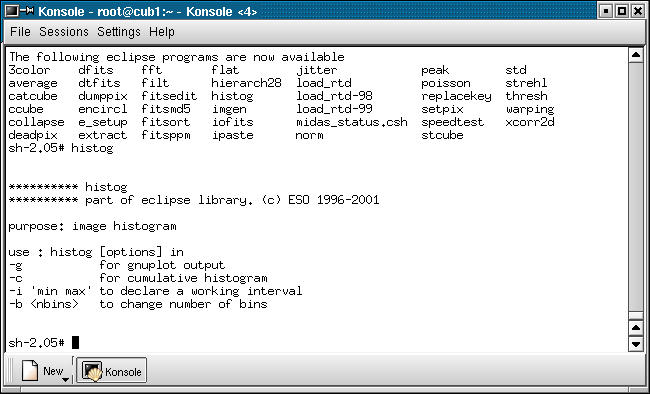Contents
Previous
Next

Astronomical image processing package
Version : 4.3.0
Author(s) : Nicolas Devillard and Yves Jung, ESO
License : ESO
Website :
http://www.eso.org/projects/aot/eclipse/
Disk space required for installation is 12.18 Mb
After the package is installed it can be accessed using the command
/opt/lfa/starteclipse
A shortcut will be installed in the KDE/GNOME desktop menu system,
as an entry in the Astronomy submenu
The following printable documents will be installed :
- /opt/lfa/doc/eclipse/ps/devel.ps.gz
- /opt/lfa/doc/eclipse/ps/eug.ps.gz
- /opt/lfa/doc/eclipse/ps/devel.ps.gz
- /opt/lfa/doc/eclipse/ps/eug.ps.gz
- /opt/lfa/doc/gildas/doc/program.ps
Summary
eclipse is not IRAF. It is a data reduction engine written in C for
portability and speed reasons. From this C library, the ISAAC pipeline
team has built a number of Unix commands
that are specialized for ISAAC imaging and spectroscopy data
processing. We have put into it the know-how of the instrument
scientist, and many other contributing people. We do
believe that what is actually done by these routines is
representative of what most people will want to do with the data.
You do not "learn" eclipse. The commands are more or less
dedicated, one per template. What you have to learn is more or less
similar to learning new IRAF commands (what to put
in 'epar', how to launch it, learn what is happening in the
algorithm, etc.). You do not have to learn a new language, because what
it takes is launching a Unix command, not more.
Now, if you think you have better routines, IRAF scripts or
whatever, you will probably be more efficient with tools you have
written, you know where they fail and where they work. If
you have no clue about ISAAC data reduction or if what you want to
do is already performed by an eclipse command, you will be faster and
more efficient using it. If you want to do
something non-trivial that is not supported in the eclipse
commands, or if you need any kind of interactive algorithm, you have no
choice but use interactive environments like IRAF.
Anyway, past some point you will need something like IRAF to
interact with your data to see what is in there. eclipse only covers
the first stages of data reduction, until an
astronomical knowledge of the data is required to go further. Then
it is the astronomer's job and no software can do it in your place.
Screenshots

Contents
Previous
Next


